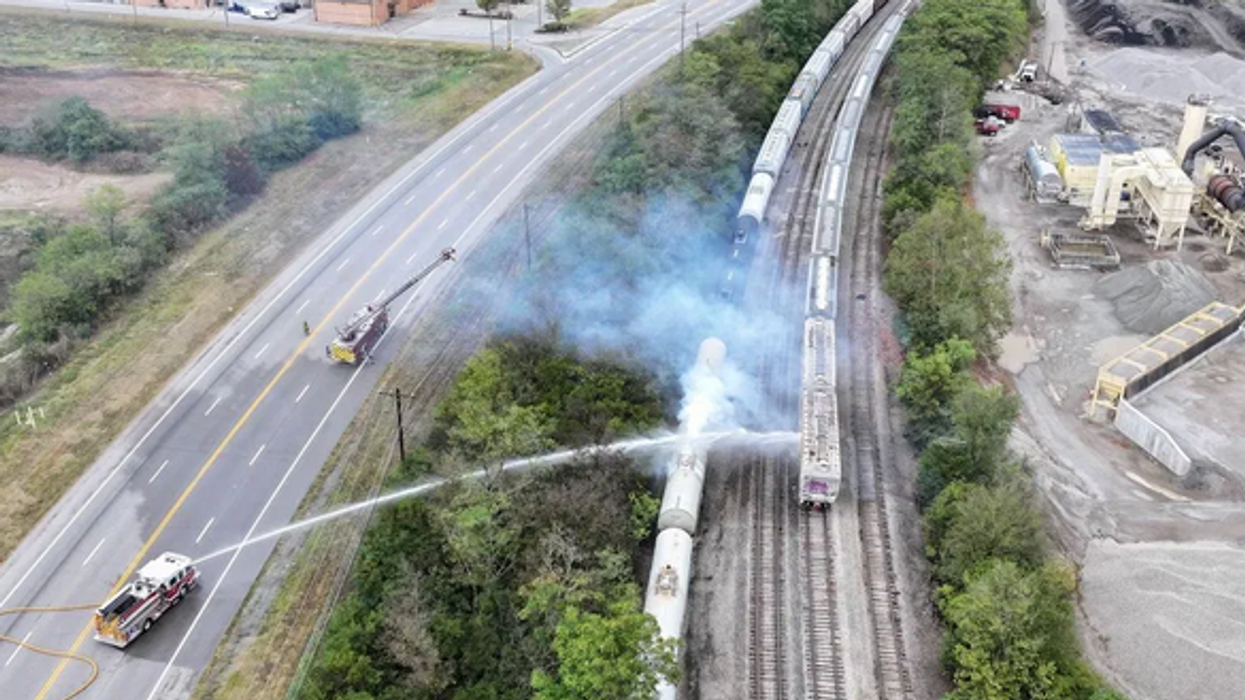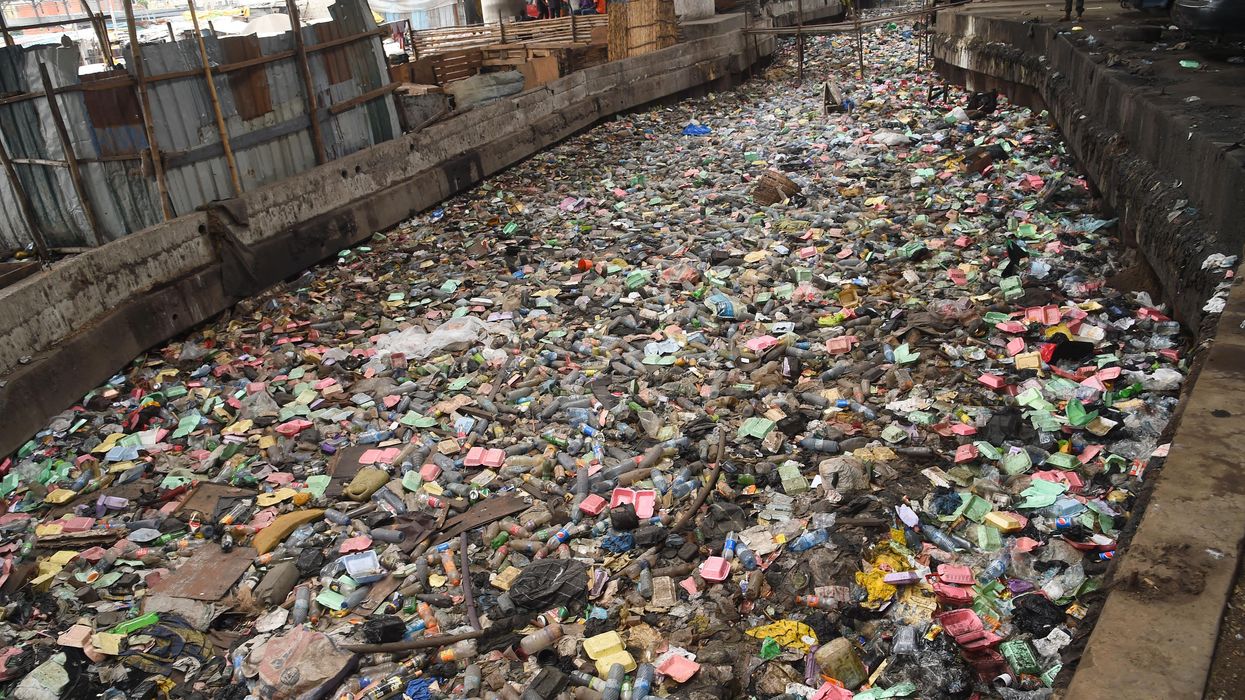Concerns Raised About Toxic Exposure in Aftermath of Helene Floodwaters
"All of these rivers should be treated as hazmat sites," a local official in western North Carolina said.
Local officials, academic researchers, and volunteer responders have raised concerns about chemical and biological contamination brought by the floodwaters of Hurricane Helene in the southeastern U.S. last week, which potentially threaten the safety not only of drinking water but also the quality of soil—leading experts to call for tighter regulations on stored pollutants.
Helene struck Florida as a Category 4 hurricane on September 26 and swept through a number of states in the days that followed. Most of the damage came from extreme rainfall that triggered flooding. The storm killed at least 232 people.
The biological and chemical threats posed by floodwaters are typically manifold, often containing, for example, e. coli from overflowing sewage systems.
While it's not yet clear what bacteria or chemicals Helene's floodwaters may have contained, the storm passed through hundreds of industrial sites with toxic pollutants, including paper mills, fertilizer factories, oil and gas storage facilities, and even a retired nuclear plant, according to three researchers at Rice University, writing in The Conversation this week.
The researchers called for tighter regulations on the storage and release of chemical pollutants.
"Hazardous releases remain largely invisible due to limited disclosure requirements and scant public information," they wrote. "Even emergency responders often don’t know exactly which hazardous chemicals they are facing in emergency situations."
"We believe this limited public information on rising chemical threats from our changing climate should be front-page news every hurricane season," they added. "Communities should be aware of the risks of hosting vulnerable industrial infrastructure, particularly as rising global temperatures increase the risk of extreme downpours and powerful hurricanes."
Another devastating scene due to Hurricane Helene’s impact in several states. We are in the historic downtown area of Marshall, N.C. where the clean up process has started. We’ve seen people with PPE and hazmat suits as we’ve been hearing the mud in this area is hazardous. pic.twitter.com/K52uZceDE4
— Cristina Corujo (@cristina_corujo) October 4, 2024
The devastation of infrastructure and the lack of drinking water in cities such Asheville, North Carolina, has rightly received national media attention following the storm. In North Carolina alone, more than 700,000 households lost power, and 170,000 still didn't have it as of Thursday.
Yet the National Weather Service warns that while floodwaters can create clear-cut devastation, "what you can't see can be just as dangerous." Helene also brought with it public health concerns that are less obvious, including to other, non-public sources of drinking water.
Helene's floodwaters overran many wells, rendering them unsafe to drink, at least until treatment and testing can be done. North Carolina's Department of Health and Human Services advised residents not to use contaminated well water earlier this week.
One problem following Helene is that most studies of flooding's impact on drinking water have been done in coastal areas, and it's not clear how they apply to the mountainous areas of North Carolina that took the worst hit from the storm.
"We don't have a lot of knowledge about mountain flooding, from a hydrology standpoint," Kelsey Pieper, a professor in environmental engineering at Northeastern University, told Inside Climate News.
"Water velocities tend to be higher in mountain floodings because it's getting funneled into the valley, where the water is accumulating. In a coastal area, you’re going to see more water spreading out," she said. "The flooding mechanisms are different, and we know very little."
Wells tested in eastern North Carolina after Hurricane Florence in 2018 showed some detections of e. coli or total fecal coliform, which were partly attributed to industrialized hog farms in the area, Inside Climate News reported.
Crops are often rendered unsafe after flooding due to biological or chemical contamination, according to Food Safety Alliance.
Natural bodies of water are also often unsafe to swim in following floods. Virginia Department of Health and other agencies warned people to avoid them after Helene.
The period after a tropical storm brings increased risk of both biological contaminants, such as bacteria and viruses, and chemical contaminants, such as heavy metals and pesticides, according to the Duke University Superfund Research Center.
Following Helene, a grassroots volunteer cleanup effort has sprung up in western North Carolina, but it brings risks for the volunteers because of the potential contamination.
"We were supposed to get a big shipment of gloves, coveralls, masks, respirators, but we aren't," Rachel Bennett, a coordinating volunteer in the town of Marshall, which sits along the banks of the French Broad River, told the Citizen Times, an Asheville newspaper. "So, we're hoping to get more. Those are the big things because we're in cleanup right now. We need thick things."
"Right now, it's boots, and it's hard to get people to put on gloves, because when you're in this, you're like, 'I'm already exposed,'" she added.
A Marshall resident conducted a soil test this week but the results haven't come back yet, the newspaper reported.
"All of these rivers should be treated as hazmat sites," Buncombe County spokesperson Stacey Wood said at a briefing Friday, according to a local journalist. Buncombe County encompasses Asheville and Marshall is just outside it.
The Rice University researchers called for better preparation for future storms in the form of stronger regulation. They've developed a map showing the U.S. areas that are most vulnerable to chemical pollution brought on by floodwaters. One hotspot is the area of Texas and Louisiana full of petrochemical industry sites.
The climate crisis, driven by the burning of fossil fuels, is increasing the frequency and intensity of extreme weather events, and likely contributed to Helene's development, experts have said.
In addition to their immediate damage, storms like Helene can have surprising long-term impacts. A study published in Nature this week found that tropical storms—even those far less deadly than Helene—typically lead to many thousands of excess deaths in the 15 years that follow their arrival.


